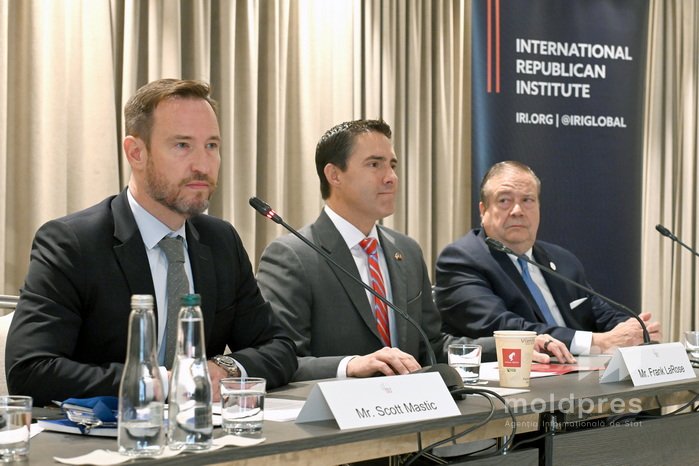
International Republican Institute: Parliamentary elections of 28 September 2025 professionally organized despite unprecedented external interference
The 28 September parliamentary elections, the first held under the newly reformed Electoral Code, were professionally organized, and the polling stations were largely well-equipped and opened on time, with a strong civic engagement and a voter turnout of 52.1%, equivalent to over 1.6 million voters, an increase of approximately 4% compared to the 2021 parliamentary elections. This is the conclusion of the International Republican Institute (IRI), which monitored the Sunday election.
According to IRI, the election was a critical test for the country's democratic resilience.
'Although the electoral process was generally competitive and well-administered, the delegation firmly condemns attempts of external interference aimed at undermining the popular will and state institutions. Through this mission, we reaffirm our support for transparent and credible elections in Moldova', stated Scott Mastic, IRI Vice President for Programs, at a press conference today.
Frank LaRose, Secretary of State of Ohio, USA, and leader of the IRI delegation, praised the efforts of the authorities and civil society.
'Moldova has made impressive progress in strengthening its democracy. The Central Electoral Commission deserves praise for the professionalism it demonstrated, especially in the context of deep external threats. However, we observed challenges such as long queues and the lack of ballots in certain stations, such as the one in Copanca, Căuşeni, intended for voters from the left bank of the Nistru, as well as concerns about the last-minute disqualification of some electoral competitors', said LaRose.
'Let’s be very clear: these challenges and malign external interferences emanate from the Russian Federation. We received credible reports of coercive tactics, intimidation, vote-buying, and threats of political violence. IRI unconditionally condemns these attempts to influence the election results and undermine state institutions. Observers noted that these actions were intensified through a wave of illegal funding, including the use of cryptocurrencies', the source noted.
Based on the findings, the IRI mission formulated a series of recommendations to strengthen Moldova’s democratic processes, including the continuing update of electoral lists to ensure their accuracy, with a special focus on citizens in the diaspora; expanding the possibility of postal voting to facilitate the participation of a larger number of citizens abroad; strengthening the capacity of institutions to combat illicit funding and ensure law enforcement to hold internal and external provocateurs accountable; amending audiovisual legislation to eliminate ambiguities and prevent misinformation while protecting freedom of expression.
The delegation emphasized that Moldova's democratic progress is real but fragile. Continued vigilance, sustained reforms, and strong international support are essential to defend the country’s sovereign choice. IRI will publish a detailed final report in about a month.
The mission, comprising 24 international observers, was conducted at the invitation of the Central Electoral Commission of Moldova and monitored the voting process in the municipalities of Chisinau and Balti, in the Autonomous Territorial Unit of Gagauzia, in polling stations designated for citizens from the Transnistrian region, as well as within the diaspora in Italy, Germany, France, and the United Kingdom.
The International Republican Institute is a non-profit, non-partisan organization based in the United States, dedicated to promoting democracy and freedom worldwide. In Moldova, IRI has been active since 2007, with an operational office in Chisinau.
IRI collaborates with various institutions and international organizations to support Moldova's European integration process. It also actively participates in internal political dialogue and contributes to developing a political culture based on democratic values.
Alegeri parlamentare 2025
Moldova's citizens expected to vote to elect MPs
Alegeri parlamentare 2025
Preliminary results: MPs likely to be in future Parliament
Romanian Prime Minister congratulates Moldovan citizens for mobilization in parliamentary elections
Alegeri parlamentare 2025
CEC: After processing over 99 percent of reports
Alegeri parlamentare 2025
PHOTO GALLERY // Parliamentary elections 2025: vote counting, under MOLDPRES's lens
Alegeri parlamentare 2025
Moldovan Central Electoral Commission confirms parliamentary elections' validity, announces preliminary results
Moldovan president thanks Moldovans from home, Diaspora for voting
Alegeri parlamentare 2025
Moldovan Socialists' leader says not to allow destabilizations, strictly against concerned scenarios
Alegeri parlamentare 2025
President of Moldova's Action of Solidarity Party says electoral process continues abroad, calls for showing vigilance until votes are counted
President: Russia will attempt to create problems for us, but it cannot stop us as most citizens expressed their choice to join EU
Head of State: I want Moldova to be free country, so that people can protest, but protests should be authentic
PHOTO GALLERY // President's first press conference after 28 September parliamentary elections
Alegeri parlamentare 2025
CEC completes vote counting process
Promo-LEX observers reported about a thousand incidents during parliamentary voting
Igor Grosu on Moldova's accession to EU together with Transnistrian region
Patriotic Bloc protested at Parliament
President of Latvia and Prime Minister of Croatia sent congratulations to Moldovan citizens
Emmanuel Macron's message after parliamentary elections
Ukrainian President: Elections showed that Russia's destabilizing activity losing, while Moldova in Europe winning
International Republican Institute: Parliamentary elections of 28 September 2025 professionally organized despite unprecedented external interference
VIDEO // Romanian president's message for citizens and authorities across Prut
Alegeri parlamentare 2025
PM: Elections have shown that when state and citizens defend their country together, people and democracy win
Alegeri parlamentare 2025
VIDEO // Speaker: Thank you to citizens for defending their country through voting. Moldova impressed whole world and gave most important lesson of democracy
European Union leaders welcome PAS victory in Moldova's parliamentary elections
Alegeri parlamentare 2025
CEC President: Parliamentary elections conducted in free way without major incidents


